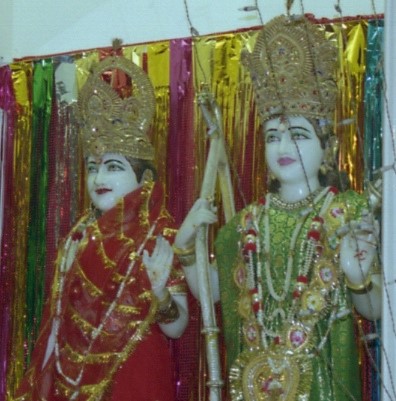Continuing his tour round the religions of East London, un-believer Matt Wright encounters an (almost) unbelievably relaxed attitude when visiting the Hindu temple in Ilford.
‘You have to ring the bell when you come in the temple.’
‘Why?’
‘Because you’re entering God’s house! Wouldn’t you be annoyed if someone walked into your house without ringing the bell?’
And so began my introduction to what is in all likelihood the most complex (and oldest) of all major world religions, Hinduism.
Perhaps Hinduism is so complex that no one is expected to know all the rules. Anyhow, apart from the initial insistence about ringing the bell before entry, although there were recurring themes, when I visited the Hindu temple in Ilford I encountered very little by way of strict rules and heavily regulated observance.
The home and God’s presence in it is one of themes which recurs throughout the Hindu faith. Across the world, more than a billion worshippers are devoted to the presence of God in their homes; and what is true worldwide is equally true of God’s home in Ilford.
Next to home comes family, and the faith is so centred around the family that Hindu parents have at their disposal a textbook response to the classic teenage mantra: ‘I didn’t choose to be born, Mum!’
‘Well, yes you did!’
The Hindu belief is that all souls choose where they wish to be reincarnated, until finally reaching ‘Moksha’ – ultimate enlightenment. At which point, after countless karma-constructing reincarnations, the soul finally re-unites with God.
Hinduism attempts to give order to this progression by specifying a narrative schedule of human life.
- 0-25yrs are devoted to education and learning
- 25-50yrs are devoted to setting up a home and raising a family
- 50-75yrs are devoted to preparing to leave your family and home – saving money for them
- 75-death are devoted to leaving your family and home behind and learning the Vedas. Usually wandering around the sub-continent visiting Holy places and shrines.
Hindus believe that when a priest comes and blesses the statue of a deity, whether that deity be Lord Shiva (the Destroyer God), the Goddess Lakshmi (Goddess of wealth and family), or Lord Hanuman (the Monkey God of strength), God actually takes residence in the statue.

Moreover, as soon as God has entered the statue, priests and devotees are required to treat it as such – washing the deity once a day, leaving food twice a day, and praying in honour of the God-statue. Meanwhile the entire community is required to take part in the worship and upkeep of the Temple.
The Ilford temple, as colourful and vibrant as any Hindu place of worship, is only a few doors down the street from the Ilford mosque. But there seems to be remarkably little tension between the two communities, especially considering that some of the temple’s funding comes from Hindutva, the frequently hardline group associated with the Vishwa Hindu Parishad (VHP).
After chatting for well over an hour with my charming host I start to think about leaving. Should I go now or stay till later? I don’t want to offend anyone by walking out just as a service is about to start. But I am reassured that there are very few set times in Hinduism. Apart from high holy days, which come round only occasionally, people come when they feel the need to, and they are equally free to leave whenever they want.
It strikes me that if you really must have a religion, this is not a bad way to go about it.

